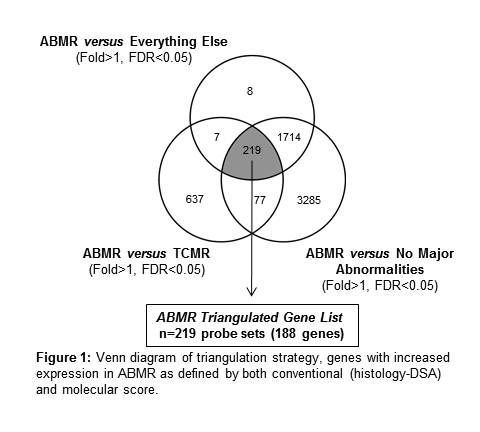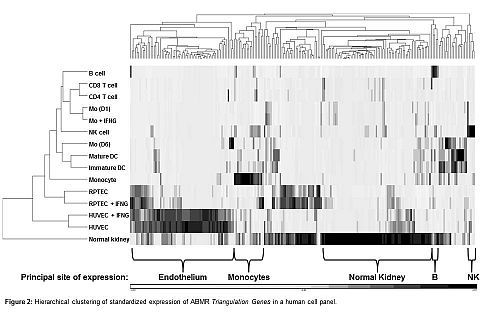Molecular Landscape of Antibody-Mediated Rejection: Reading Endothelial Cell Biology in the Microcirculation, The
University of Alberta, Edmonton, Canada
Meeting: 2013 American Transplant Congress
Abstract number: 329
Because experimental models are lacking, the recent emergence of a molecular definition of antibody-mediated rejection (ABMR) presents opportunities to characterize the mechanisms operating in ABMR. To define molecules unique to ABMR, we selected indication biopsies diagnosed as ABMR both by conventional methods (histology, DSA) and microarrays. We identified molecules increased in ABMR by a triangulation strategy: ABMR vs. all other diseases; ABMR vs. T cell-mediated rejection (TCMR); and ABMR vs. stable transplants (Figure 1). This identified transcripts operating uniquely in ABMR and not in TCMR and other diseases.
Triangulation transcripts included endothelial molecules identified in previous studies: e.g. CDH13, DARC, GNG11. Many suggest relevant endothelial biology: TEK (angiopoeitin receptor), FIGF (VEGFD), CD59 (complement inhibitory protein), VWF (coagulation), EDN1 (endothelin 1), NOSTRIN (modulates NO release), EPHRIN (angiogenesis). By Ingenuity Pathway Analysis, the enriched Canonical Pathways were related to coagulation and to Rho, G protein, and eNOS signaling. Enriched KEGG pathways included Focal adhesion and ECM-receptor interaction. However, in gene set enrichment analysis no existing pathways distinguished ABMR from TCMR, confirming the novelty of the triangulated ABMR transcripts.
In cell lines, some triangulation transcripts were expressed in HUVECs, possibly associated with development (e.g. CDH13, CAV1, TEK, EDN1). But others were expressed in normal kidney but not in HUVECs or other cell lines, and were associated with cell/matrix adhesion (e.g. TNXA/B, JAM2, COL4A6, CXADR) (Figure 2), presumably expressed in normal microcirculation but increased in ABMR. Thus the triangulated ABMR transcripts reflect a unique microcirculation remodeling state unlike TCMR and other diseases, which has not previously been captured in experimental models.


To cite this abstract in AMA style:
Venner J, Famulski K, Halloran P. Molecular Landscape of Antibody-Mediated Rejection: Reading Endothelial Cell Biology in the Microcirculation, The [abstract]. Am J Transplant. 2013; 13 (suppl 5). https://atcmeetingabstracts.com/abstract/molecular-landscape-of-antibody-mediated-rejection-reading-endothelial-cell-biology-in-the-microcirculation-the/. Accessed February 27, 2026.« Back to 2013 American Transplant Congress
